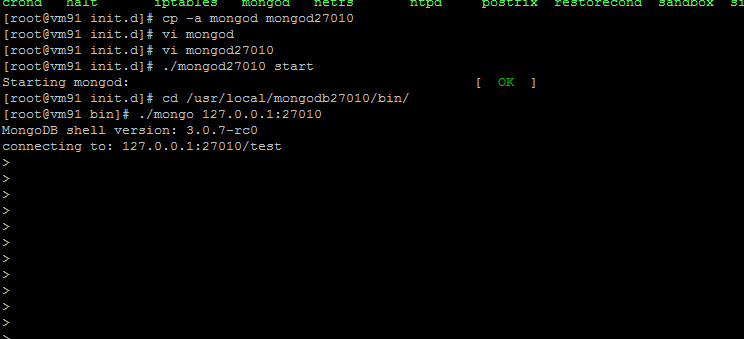上面介绍了mongodb的安装,已经可以直接启动,但是如果我们之间写入系统服务,启动更加方便。

cd /etc/init.d/
vi mongod
#!/bin/bash
#guoguo.it wwww.guoguo.it
#init.d-mongod
# mongod - Startup script for mongod
# chkconfig: 35 85 15
# description: Mongo is a scalable, document-oriented database.
# processname: mongod
# config: /etc/mongod.conf
# pidfile: /var/run/mongodb/mongod.pid
. /etc/rc.d/init.d/functions
# things from mongod.conf get there by mongod reading it
# NOTE: if you change any OPTIONS here, you get what you pay for:
# this script assumes all options are in the config file.
CONFIGFILE="/usr/local/mongodb27010/etc/mongod.conf"
OPTIONS=" -f $CONFIGFILE"
SYSCONFIG="/etc/sysconfig/mongod"
PIDFILEPATH=`awk -F'[:=]' -v IGNORECASE=1 '/^[[:blank:]]*(processManagement\.)?pidfilepath[[:blank:]]*[:=][[:blank:]]*/{print $2}' "$CONFIGFILE" | tr -d "[:blank:]\"'"`
mongod=${MONGOD-/usr/local/mongodb27010/bin/mongod}
MONGO_USER=mongod
MONGO_GROUP=mongod
if [ -f "$SYSCONFIG" ]; then
. "$SYSCONFIG"
fi
PIDDIR=`dirname $PIDFILEPATH`
# Handle NUMA access to CPUs (SERVER-3574)
# This verifies the existence of numactl as well as testing that the command works
NUMACTL_ARGS="--interleave=all"
if which numactl >/dev/null 2>/dev/null && numactl $NUMACTL_ARGS ls / >/dev/null 2>/dev/null
then
NUMACTL="numactl $NUMACTL_ARGS"
else
NUMACTL=""
fi
start()
{
# Make sure the default pidfile directory exists
if [ ! -d $PIDDIR ]; then
install -d -m 0755 -o $MONGO_USER -g $MONGO_GROUP $PIDDIR
fi
# Recommended ulimit values for mongod or mongos
# See http://docs.mongodb.org/manual/reference/ulimit/#recommended-settings
#
#ulimit -f unlimited
#ulimit -t unlimited
#ulimit -v unlimited
#ulimit -n 64000
#ulimit -m unlimited
#ulimit -u 64000
echo -n $"Starting mongod: "
daemon --user "$MONGO_USER" --check $mongod "$NUMACTL $mongod $OPTIONS >/dev/null 2>&1"
RETVAL=$?
echo
[ $RETVAL -eq 0 ] && touch /var/lock/subsys/mongod
}
stop()
{
echo -n $"Stopping mongod: "
mongo_killproc "$PIDFILEPATH" $mongod
RETVAL=$?
echo
[ $RETVAL -eq 0 ] && rm -f /var/lock/subsys/mongod
}
restart () {
stop
start
}
# Send TERM signal to process and wait up to 300 seconds for process to go away.
# If process is still alive after 300 seconds, send KILL signal.
# Built-in killproc() (found in /etc/init.d/functions) is on certain versions of Linux
# where it sleeps for the full $delay seconds if process does not respond fast enough to
# the initial TERM signal.
mongo_killproc()
{
local pid_file=$1
local procname=$2
local -i delay=300
local -i duration=10
local pid=`pidofproc -p "${pid_file}" ${procname}`
kill -TERM $pid >/dev/null 2>&1
usleep 100000
local -i x=0
while [ $x -le $delay ] && checkpid $pid; do
sleep $duration
x=$(( $x + $duration))
done
kill -KILL $pid >/dev/null 2>&1
usleep 100000
checkpid $pid # returns 0 only if the process exists
local RC=$?
[ "$RC" -eq 0 ] && failure "${procname} shutdown" || rm -f "${pid_file}"; success "${procname} shutdown"
RC=$((! $RC)) # invert return code so we return 0 when process is dead.
return $RC
}
RETVAL=0
case "$1" in
start)
start
;;
stop)
stop
;;
restart|reload|force-reload)
restart
;;
condrestart)
[ -f /var/lock/subsys/mongod ] && restart || :
;;
status)
status $mongod
RETVAL=$?
;;
*)
echo "Usage: $0 {start|stop|status|restart|reload|force-reload|condrestart}"
RETVAL=1
esac
exit $RETVAL
service mongod start
启动mongodb
chkconfig mongod on
加入系统服务开机启动
转载请注明:果果.IT » 果果.IT 笔记-Mongodb启动脚本篇